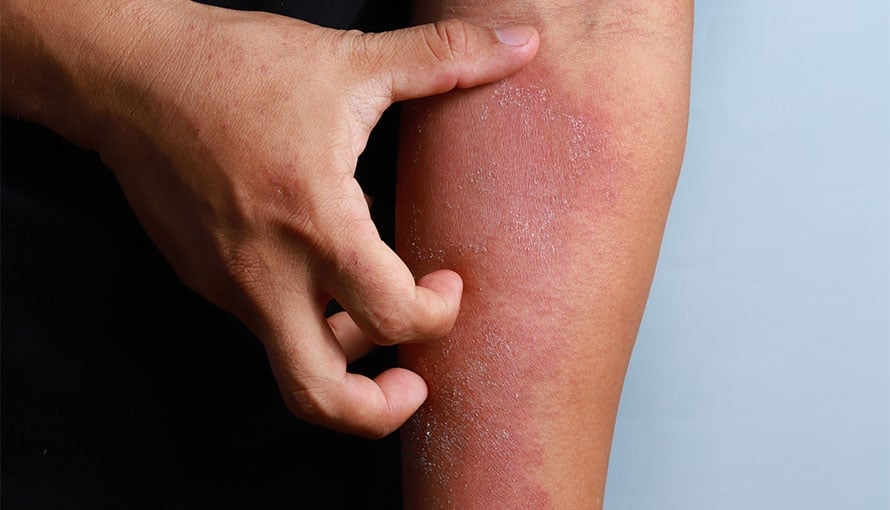One of Only Five Multidisciplinary Cutaneous Lymphoma Clinics in U.S. is at Moffitt

Cutaneous lymphomas are a heterogenous group of lymphoproliferative disorders that present in the skin and are composed of malignant clonal T- or B-lymphocytes. Approximately 75-80% of all primary cutaneous lymphomas are cutaneous T-cell lymphomas (CTCL), with the remaining 20-25% representing primary cutaneous B-cell lymphomas (CBCL). The clinical course of most CTCLs is unpredictable and disease progression varies widely, with some patients demonstrating indolent clinical course for decades and others progressing rapidly to advanced-stage disease. Thus, patients with cutaneous lymphomas benefit from a multidisciplinary approach to management.
Multidisciplinary cutaneous lymphoma clinics are not only efficient means for delivering patient care but also serve as an educational tool for trainees, a continuing education resource for referring physicians, and a conduit for translational and clinical research.
The Cutaneous Lymphoma Multidisciplinary Clinic (CLMC) at Moffitt offers expert treatment for patients with cutaneous B and T-cell lymphomas, including mycosis fungoides, Sezary syndrome, CD30+ lymphoproliferative disorders, aggressive T- and B-cell lymphomas, and blastic plasmacytoid dendritic cell neoplasm (BPDCN). Patients with suspected lymphomas and/or biopsies with atypical Iymphocytic infiltrates are also evaluated. It is a referral clinic for all of the Southeast region of the United States and it is one of only five institutions that offers multi-disciplinary care for patients with cutaneous lymphomas. The CLMC sees approximately 250 new patients and 1,000-1,200 established patients each year, for a disease with only 1,600 newly diagnosed cases a year in the United States.
The multispecialty cutaneous lymphoma treatment team can offer your patients comprehensive services, including:
- Consultations
- Diagnostic services
- Cutaneous lymphoma-specific systemic therapies (e.g., interferon, methotrexate, bexarotene, vorinostat)
- lntralesional therapies (e.g., interferon, methotrexate, rituximab)
- Photopheresis
- Infusion therapies (e.g., brentuximab, romiclepsin, mogamulizumab, pralatrexate, rituximab)
- Nb-UVB phototherapy
- PUVA phocotherapy
- Local electron beam radiation therapy
- Total skin electron beam radiation therapy
- Chemotherapy
- Hematopoietic stem cell transplant program
- Clinical trials
Prior to each patient's first consultation, medical records, pathology slides and diagnostic imaging are requested and reviewed by dermatopathologists and/or hematopathologists with expertise in cutaneous lymphomas. Laboratory studies, including blood flow cytometry, are obtained the clay of the visit prior to the consultation.
All new patients are first evaluated by a collaborative team of dermatology, dermatopathology, hematopathology and medical oncology to formulate an assessment and individualized treatment plan for each patient. Patients are staged according to NCCN guidelines and utilizing comprehensive laboratory testing, blood flow cytometry, molecular tests, diagnostic imaging, biopsies for immunostainings and molecular tests. In-clinic biopsies and tissue cultures are performed by the dermatology team.
Moffitt also offers numerous patient support services such as social work and dietitian consultations. In fact, after patients are seen at our clinic, we facilitate seamless referrals back to their local dermatology, medical oncology, and radiation oncology specialists, collaborating closely to ensure comprehensive management of their healthcare needs. Additionally, we offer virtual consultations upon patient request to enhance accessibility and convenience.
In addition to the multidisciplinary clinic model, the clinical and pathology teams host a bi-monthly tumor board conference. Medical oncologists, surgical oncologists and staff and trainees from different specialties attend the tumor board meeting. A diagnosis, treatment and/or follow-up plan is established for each patient and recorded in the EMR.
This multidisciplinary clinic operates Tuesday mornings and Thursday afternoons at the Moffitt McKinley Outpatient Center (located on the 4th floor in the Cutaneous Oncology Clinic). Secondary patient care sites include the photopheresis unit and infusion center located at the Moffitt Magnolia campus and the Radiation Oncology suites located at Moffitt at International Plaza. The phototherapy unit is located at the USF Health Morsani center for Advanced Healthcare, Dermatology and Cutaneous Surgery Department clinics, and a PA is available at Moffitt Cancer Center at Wesley Chapel. USF and Moffitt Cancer Center have affiliation agreements.
If you would like to refer a patient to Moffitt's Cutaneous Oncology Program, complete our online form or contact a physician liaison for assistance. As part of our efforts to shorten referral times as much as possible, online referrals are typically responded to within 24 - 48 hours.
